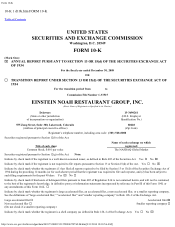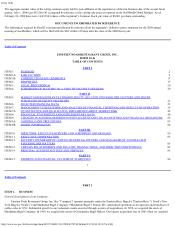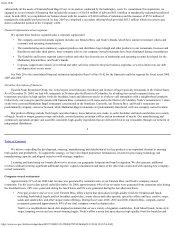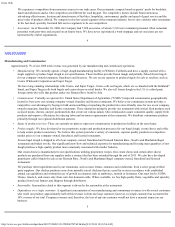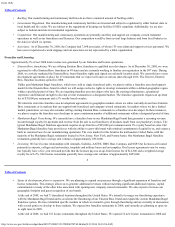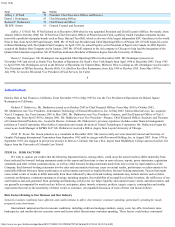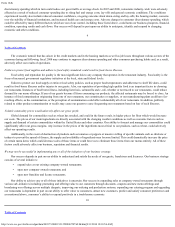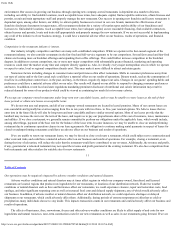Einstein Bros 2008 Annual Report Download - page 9
Download and view the complete annual report
Please find page 9 of the 2008 Einstein Bros annual report below. You can navigate through the pages in the report by either clicking on the pages listed below, or by using the keyword search tool below to find specific information within the annual report.
Form 10-K
http://www.sec.gov/Archives/edgar/data/949373/000119312509042707/d10k.htm[9/11/2014 10:10:56 AM]
discretionary spending which in turn could reduce our guest traffic or average check. In 2007 and 2008, restaurants industry-wide were adversely
affected as a result of reduced consumer spending due to rising fuel and energy costs, lay-offs and general economic conditions. The conditions
experienced recently also include reduced consumer confidence, on-going concerns about down-sizing and lay-offs, the housing market, concerns
over the stability of financial institutions, and increased health care and energy costs. Adverse changes in consumer discretionary spending, which
could be affected by many different factors which are out of our control, including those listed above, could harm our business prospects, financial
condition, operating results and cash flows. Our success will depend in part upon our ability to anticipate, identify and respond to changing
economic and other conditions.
9
Table of Contents
The economic turmoil that has arisen in the credit markets and in the housing markets as well as job losses throughout various sectors of the
economy during and following fiscal 2008 may continue to suppress discretionary spending and other consumer purchasing habits and, as a result,
adversely affect our results of operations.
Failure to protect food supplies and adhere to food safety standards could result in food-borne illnesses.
Food safety and reputation for quality is the most significant risk to any company that operates in the restaurant industry. Food safety is the
focus of increased government regulatory initiatives at the local, state and federal levels.
Failure to protect our food supply or enforce food safety policies, such as proper food temperatures and adherence to shelf life dates, could
result in food-borne illnesses and/or injuries to our guests. Also, our reputation of providing high quality food is an important factor in choosing
our restaurants. Instances of food borne illness, including listeriosis, salmonella and e-coli, whether or not traced to our restaurants, could reduce
demand for our menu offerings. If any of our guests become ill from consuming our products, the affected restaurants may be forced to close. An
instance of food contamination originating from one of our restaurants, our commissaries or suppliers, or our manufacturing plant could have far-
reaching effects, as the contamination, or the perception of contamination could affect substantially all of our restaurants. In addition, publicity
related to either product contamination or recalls may cause our guests to cease frequenting our restaurants based on fear of such illnesses.
Volatile commodity prices would adversely affect our gross profit.
Global demand for commodities such as wheat has resulted, and could in the future result, in higher prices for flour which would increase
our costs. The prices of our main ingredients are directly associated with the changing weather conditions as well as economic factors such as
supply and demand of certain commodities within the United States and other countries. Our ability to forecast and manage our commodities could
significantly affect our gross margins. Any increase in the prices of the ingredients most critical to our products, such as wheat, could adversely
affect our operating results.
Additionally, in the event of destruction of products such as tomatoes or peppers or massive culling of specific animals such as chickens or
turkeys to prevent the spread of disease, the supply and availability of ingredients may become limited. This could dramatically increase the price
of certain menu items which could decrease sales of those items or could force us to eliminate those items from our menus entirely. All of these
factors could adversely affect our business, reputation and financial results.
We may not be successful in implementing any or all of the initiatives of our business strategy.
Our success depends in part on our ability to understand and satisfy the needs of our guests, franchisees and licensees. Our business strategy
consists of several initiatives:
• expand sales at our existing company-owned restaurants;
• open new company-owned restaurants; and
• open new franchise and license restaurants.
Our ability to achieve any or all of these initiatives is uncertain. Our success in expanding sales at company-owned restaurants through
various sub-initiatives including: promoting and offering value to our customers through discounts, coupons and new menu offerings and
broadening our offerings across multiple dayparts, improving our ordering and production systems, expanding our catering program and upgrading
our restaurants is dependent in part on our ability to offer value to consumers, attract new customers, predict and satisfy consumer preferences and
as mentioned above, consumer’ s ability to respond positively in a troublesome economic
10
Table of Contents

